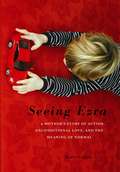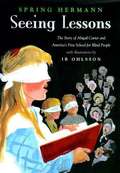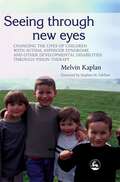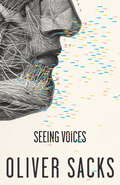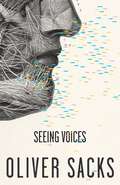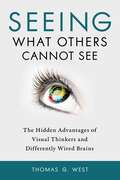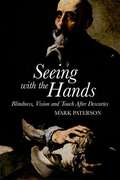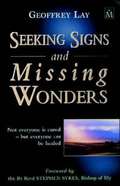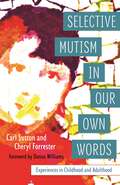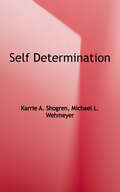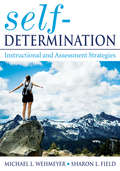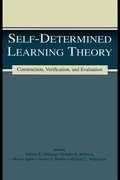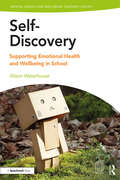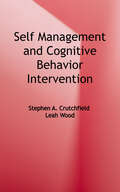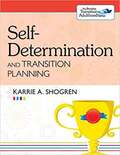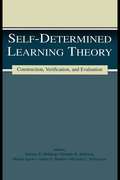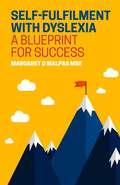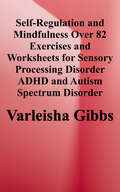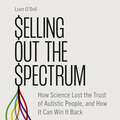- Table View
- List View
Seeing Ezra: A Mother's Story of Autism, Unconditional Love, and the Meaning of Normal
by Kerry CohenSeeing Ezra is the soulful, beautifully written memoir of a mother's fierce love for her autistic son, and a poignant examination of what it means to be "normal." When Kerry Cohen's son Ezra turns one, a babysitter suggests he may be "different," setting her family on a path in which autism dominates their world. As he becomes a toddler and they navigate the often rigid and prescriptive world of therapy, Cohen is unsettled by the evaluations they undergo: At home, Ezra is playfully expressive, sharing profound, touching moments of connection and intimacy with his mother and other family members, but in therapy he is pathologized, prodded to behave in ways that undermine his unique expression of autism.It soon becomes clear that more is at stake than just Ezra's well-being; Cohen and her marriage are suffering as well. Ezra's differentness, and the strain of pursuing varied therapies, takes a toll on the family-Cohen's husband grows depressed and she pursues an affair-all as she tries to help others recognize and embrace Ezra's uniqueness rather than force him to behave outside his comfort level. It isn't until they abandon the expected, prescriptive notions about love, marriage, and individuality that they are able to come back together as two parents who fiercely love their little boy.Powerful and eye-opening, Seeing Ezra is an inspirational chronicle of a mother's struggle to protect her son from a system that seeks to compartmentalize and "fix" him, and of her journey toward accepting and valuing him for who he is-just as he is.
Seeing Lessons: The Story Of Abigail Carter And America's First School For Blind People
by Spring Hermann Ib OhlssonIn 1832, when Abigail Carter was only ten years old, two doctors from Boston invited her to be one of the first students in an experimental institution: a school for blind people. Abby and her younger sister Sophia, also blind, packed their bags and headed to the city. For the first time in their lives, the two girls were able to read a book for themselves and to write a letter to their father. <p><p> This small start-up school developed into the Perkins School for the Blind. From this school graduated Annie Sullivan, Helen Keller's influential teacher. <p> Readers who love Helen Keller's story won't want to miss this inspiring story of courage and perseverance.
Seeing Through Blindness
by Matt HarrisSeeing through Blindness is a memoir written in the form of a narrative poem that reads like a novel. It will be a blessing to anyone who has ever struggled with God, or a drug addiction, or a disability. I have battled with all three and through God's grace have been victorious. The topics I have written about in my book are raw and from the heart. And, so, from an emotional perspective, Seeing through Blindness drew me out of my comfort zone, but, at the same time, it needed to be written and was cathartic. So, with poetry as my shovel, I dug deeply into my past and unearthed this casket of memories that lied buried for years. It covers a period in my life, from ages 11 to 22, which gives readers a glimpse into one of the most painful and defining phases of my life. I opened up this peephole into my past to show who I was before I surrendered my life to Jesus Christ. I hope the person who materializes through these pages might become a torch to help guide someone from out of darkness and toward hope. And though only a sliver of my eyesight remains, I am still Seeing through Blindness by the Light of Jesus, my Lord.
Seeing Through New Eyes: Changing the Lives of Children with Autism, Asperger Syndrome and other Developmental Disabilities Through Vision Therapy
by Stephen M. Edelson Melvin KaplanSeeing Through New Eyes offers an accessible introduction to the treatment of visual dysfunction, a significant but neglected problem associated with autism spectrum disorders (ASDs) and other developmental disabilities. Dr. Kaplan identifies common ASD symptoms such as hand-flapping, poor eye contact and tantrums as typical responses to the confusion caused by vision disorder. He also explains the effects of difficulties that people with autism experience with "ambient vision", including a lack of spatial awareness and trouble with coordination. Other chapters give guidance on how to identify the visual deficits of nonverbal children, select prism lenses that will alter the visual field, and create individually tailored programs of therapy in order to retrain the system. This book is essential reading for parents of children with ASDs, and professionals in the fields of autism, optometry and ophthalmology, psychology and education.
Seeing Voices
by Oliver SacksThe renowned neurologist and bestselling author of The Man Who Mistook His Wife for a Hat takes us on a journey into the world of deaf culture, and the underpinnings of the remarkable visual language of the congenitally deaf. "This book will shake your preconceptions about the deaf, about language and about thought.... One of the finest and most thoughtful writers of our time." —Los Angeles Times Book ReviewLike The Man Who Mistook His Wife for a Hat, this is a fascinating voyage into a strange and wonderful land, a provocative meditation on communication, biology, adaptation, and culture. In Seeing Voices, Oliver Sacks turns his attention to the subject of deafness, and the result is a deeply felt portrait of a minority struggling for recognition and respect—a minority with its own rich, sometimes astonishing, culture and unique visual language, an extraordinary mode of communication that tells us much about the basis of language in hearing people as well. Seeing Voices is, as Studs Terkel has written, "an exquisite, as well as revelatory, work."
Seeing Voices: A Journey into the World of the Deaf
by Oliver SacksSign language is, in the hands of its masters, a most beautiful and expressive language.
Seeing What Others Cannot See: The Hidden Advantages of Visual Thinkers and Differently Wired Brains
by Thomas G. WestFor over 25 years, Thomas G. West has been a leading advocate for the importance of visual thinking, visual technologies and the creative potential of individuals with dyslexia and other learning differences. In this new book, he investigates how different kinds of brains and different ways of thinking can help to make discoveries and solve problems in innovative and unexpected ways. West focuses on what he has learned over the years from a group of extraordinarily creative, intelligent, and interesting people — those with dyslexia, Asperger's syndrome, and other different ways of thinking, learning, and working. He shows that such people can provide important insights missed by experts as they also can prevent institutional "group think." Based on first-person accounts, West tells stories that include a dyslexic paleontologist in Montana, a special effects tech who worked for Pink Floyd and Kiss and who is now an advocate for those with Asperger's syndrome, a group of dyslexic master code breakers in a British electronic intelligence organization, a Colorado livestock handling expert who has become a forceful advocate for those with autism and a family of dyslexics and visual thinkers in Britain that includes four winners of the Nobel Prize in Physics. He also discusses persistent controversies and the unfolding science. This is an inspiring book that not only documents the achievements of people with various learning differences, but reveals their great potential — especially in a new digital age where traditional clerical and academic skills are less and less important while an ability to think in pictures and to understand patterns using high-level computer information visualizations is rapidly increasing in value in the global economic marketplace.
Seeing with the Hands: Blindness, Vision and Touch After Descartes (Edinburgh University Press)
by Mark PatersonDrawing upon the writings of Descartes, Voltaire, Locke and others, the author reflects upon the philosophical understanding of blindness and what it suggests about the nature of perception. Central to the discussion is the Molyneux Question first posed in 1688: "Suppose a man born blind, and now adult, and taught by his touch to distinguish between a cube and a sphere of the same metal, ... and the blind man be made to see: whether by his sight before he touched them, could he now tell which is the globe and which the cube?" Patterson discusses cases of people blind from early in life who have had vision restored through surgery, and explores the similarities and differences between visual and tactile perception. The final chapter examines the autobiographical writings of blind authors including Helen Keller, John Hull, and Georgina Kleege, and how such works are understood by sighted readers.
Seeking Signs and Missing Wonders
by Geoffrey LayJeoffrey Lay went blind, through a genetic defect, in his late twenties, and his wife Christine lost a daughter at the age of five months from serious cerebral palsy and other disabilities. Geoff is not only a Christian but a parish priest with a healing ministry.
Sees Behind Trees
by Michael DorrisIn the sixteenth century, Walnut is a Native American boy who discovers that he does not see as well as others do. He develops his other senses to earn both the respect of his people and his adult name, "Sees Behind Trees." He then accompanies an elder warrior to find the mysterious "land of water."
Selective Mutism In Our Own Words: Experiences in Childhood and Adulthood
by Donna Williams Carl Sutton Cheryl ForresterAn eye-opening and enlightening collection of stories from people living with Selective Mutism (SM), this book provides a much-needed platform for people with SM to share experiences of the condition in their own words. Exploring all aspects of SM, from symptoms and diagnostic criteria, to triggers and the consequences of being psychologically unable to speak, the stories in this book dispel the myths around this often misunderstood condition. Far from refusing to talk, or choosing not to, the contributors offer genuine insights into why they simply cannot speak in certain situations or in front of certain people. Children, teens and adults from the UK and US share experiences of feeling isolated, struggling at school, and finding ways to communicate. Letting people with SM know that they are not alone with the condition, the book will also help family, friends and professionals to understand what it is like to live with SM.
Self Esteem and Adjusting with Blindness, Third Edition
by Dean W. Tuttle Naomi TuttleA book about the period of personal adjustments that accompany the loss of vision.
Self Healing: My Life and Vision
by Meir SchneiderAutobiography of Meir Schneider who was born blind, but years later, through eye exercises and movement therapy, was able to read without glasses.
Self Hypnosis for a Better Life
by William W. HewittFrom the book: WE HAVE the ability to solve most, if not all, of our problems in life if we know how. Self-hypnosis is one tool that can help us solve our problems and create better lives for ourselves. This book gives actual word-for-word self-hypnosis scripts for twenty three major problem-solving situations. Most of them will most likely apply to you at some point in your life. ... This book also includes very understandable explanations of what hypnosis is and how it works.
Self-Determination
by Michael L. Wehmeyer Karrie Ann ShogrenThis book offers specific and clearly described strategies for teaching learners with ASD to become more self-determined in their actions regarding their educational program plans and outcomes.
Self-Determination: Instructional and Assessment Strategies
by Michael L. Wehmeyer Sharon FieldThis teacher-friendly guide presents research-proven instructional techniques that empower students with disabilities to become their own advocates and use effective choice-making, problem-solving, and goal-setting skills.
Self-Determined Learning Theory: Construction, Verification, and Evaluation
by Michael L. Wehmeyer Dennis E. Mithaug Deirdre K. Mithaug Martin AgranThe authors present a theory that in the field of special education, the process of learning is adjustment, explains why freedom of choice enhances learning.
Self-Discovery: Supporting Emotional Health and Wellbeing in School (Mental Health and Wellbeing Teacher Toolkit)
by Alison WaterhouseOne of the five books in the Mental Health and Wellbeing Teacher Toolkit, this practical resource focuses on how to support children and young people on a voyage of self-discovery, as they learn to be their own best friend. The book offers research-driven, practical strategies, along with creative material and step-by-step lesson plans to support educators and health professionals. This is a resource book for practitioners looking to have a positive impact on the mental health and wellbeing of the children and young people in their care; both now and in the future. Chapters span key topics including Developing Resilience, Positive Thinking, Emotional Awareness and Self-Efficacy. A complete toolkit for teachers and counsellors, this book offers: Easy to follow and flexible lesson plans that can be adapted and personalised for use in lessons or smaller groups or 1:1 work Resources that are linked to the PSHE and Wellbeing curriculum for KS1, KS2 and KS3 New research, ‘Circles for Learning’, where the introduction of baby observation into the classroom by a teacher is used to understand and develop self-awareness, skills for learning, relationships, neuroscience and awareness of others Sections on the development of key skills in communication, skills for learning, collaboration, empathy and self-confidence Learning links, learning objectives and reflection questions. Offering research-driven, practical strategies and lesson plans, Self Discovery is an essential resource book for educators and health professionals looking for fresh, engaging ways to support the wellbeing of children and young people.
Self-Esteem And Adjusting with Blindness: The Process of Responding to Life's Demands (First Edition)
by Dean W. TuttleThis book written by a well-known professional in the field of Self Esteem discusses in easy to understand language the feelings and emotions attached to vision loss or going blind, or for that matter growing up blind. The author uses personal experiences as well as quotes from books and other people experiences to illustrate his points. This book is used as part of a course at the Hadley school for the Blind on Self-esteem. Recommended for anyone loosing their vision, growing up with vision loss, or working with blind students or friends.
Self-Management and Cognitive Behavior Interventions
by Stephen A. Crutchfield Leah WoodSelf-Management and Cognitive Behavior Interventions is a guide to using cognitive behavior modification (CBM) with students with autism spectrum disorder (ASD) to increase the student's self-management. CBM approaches include self-management intervention (SMI) and cognitive behavior intervention (CBI). SMI is synonymous with self-regulation and encompasses a variety of cognitive processes, such as controlling emotions, attending to relevant information, planning future behavior, remaining flexible through unplanned setbacks, and behaving in a way that enhances the likelihood of achieving future goals. SMI is managed by the student and is used to address a wide variety of target behaviors. CBI helps individuals examine their thoughts and emotions and adopt actions that change their thinking as well as their behavior. This book examines specific, research-based cognitive behavior interventions and self-management interventions and explores designing and implementing interventions for students with ASD.
Self-determination And Transition Planning, The Brookes Transition To Adulthood Series
by Karrie A. ShogrenSelf-determination has a powerful positive impact on post-school outcomes for young adults with disabilities—but how can educators teach students the skills they need to make their own choices and achieve their goals as they enter adulthood? This empowering guidebook shows the way. Packed with practical, research-validated guidance on explicitly teaching self-determination skills , this book helps educators support students in communicating their interests and needs, setting and reaching goals, and managing their own lives. Ready-to-use worksheets and activities will help students take an active role in their transition planning, and true case stories highlight the benefits of self-determination instruction: smoother transitions, improved behavior, and fulfilling lives beyond the classroom.
Self-determined Learning Theory: Construction, Verification, and Evaluation (The LEA Series on Special Education and Disability)
by Michael L. Wehmeyer Dennis E. Mithaug Deirdre K. Mithaug Martin Agran James E. MartinThis volume brings together four semi-autonomous bodies of research (choice, self-determination, self-regulation, and self-management) to form a new theory of self-engaged learning entitled, Self-Determined Learning Theory. This theory explains why and how students self-engage. It identifies the factors that give students the sense of control over their learning that is needed for sustained, adaptive, and ultimately successful learning. It begins by describing the characteristics of disengaged learners, then describes and illustrates self-determined learning theory within both normal and special populations. It then examines the theory's predictive value across several special population contexts and then concludes with a critique of the theory's credibility and worth. Divided into three sections--theory construction, theory verification, and theory evaluation--this volume is organized using the four steps of a previous book, Learning to Theorize: A Four Step Strategy. Step 1 defines a problem of not understanding something as discrepancy between what is known and not known about a circumstance. Step 2 searches for information and explanations to change the condition of not knowing into a condition of knowing. Step 3 evaluates the credibility and worth of the explanation constructed in Step 2. Step 4 adjusts existing beliefs so they are consistent with the new theory. Although aimed primarily at leaders in special education, it should also appeal to researchers and scholars in psychology, educational psychology, and school psychology who are interested in the applications of self-regulated learning theory--in this case to special populations.
Self-fulfilment with Dyslexia: A Blueprint for Success
by Margaret MalpasDyslexia won't stop you from writing your own success story. Discover the ten key traits which people with dyslexia have harnessed in order to reach success and self-fulfilment. Dyslexia brings both challenges and the potential gift of a unique skill set - through a combination of academic research and case studies, this book shows how you can use all of this to your advantage. From increasing your self-esteem to imaginative problem solving, each of the ten secrets to success is explained and brought to life through interviews with accomplished people describing how they have profited from a single star characteristic in realizing their goals. Approach the obstacles of dyslexia pro-actively, and unlock your potential with this inspiring step by step guide. Royalties from the sale of this book will be donated to the British Dyslexia Association.
Self-regulation and Mindfulness: Over 82 Exercises and Worksheets for Sensory Processing Disorder, ADHD, and Autism Spectrum Disorder
by Varleisha GibbsThe author has created a unique, evidence-based resource for helping children who have trouble self-regulating, staying focused, managing their senses and controlling their emotions. <p><p>Based on the latest research in neuroscience, Self-Regulation and Mindfulness provides highly practical, kid friendly lessons to teach therapists, parents, educators and children about their brain and body, so they can build the needed skills to self-regulate. <p>- Hands-on activities <p>- Step-by-step exercises <p>- Coloring pages and worksheets <p><p>Clear, concise and fun activities to address your children's arousal, attention, and social participation: <p>- Touch and Heavy Work <p>- Hydration and Oral Motor Activities <p>- Metronome, Timing and Sequencing Exercises <p>- Right and Left Brain Integration Methods <p>- Patterns and Repetition Recognition <p>- Vision and Sound Skills <p>- Movement Coordination <p>- Inhibition Techniques
Selling Out the Spectrum: How Science Lost the Trust of Autistic People, and How It Can Win It Back
by Liam O'DellWhen trust breaks down, how do we begin to fix it?Set against the controversial history of genetic research into autism, from the Spectrum 10k study led by Professor Simon Baron-Cohen to the legacy of the Andrew Wakefield MMR scandal, this book explores the ways in which autistic people have been let down by science and what needs to be done to build more effective partnerships in the future.Written by leading autistic journalist Liam O'Dell, Selling Out the Spectrum takes a thorough, balanced deep-dive into the issues surrounding the relationship between science and the autistic community, can explores how past damage can be effectively and meaningfully repaired.
